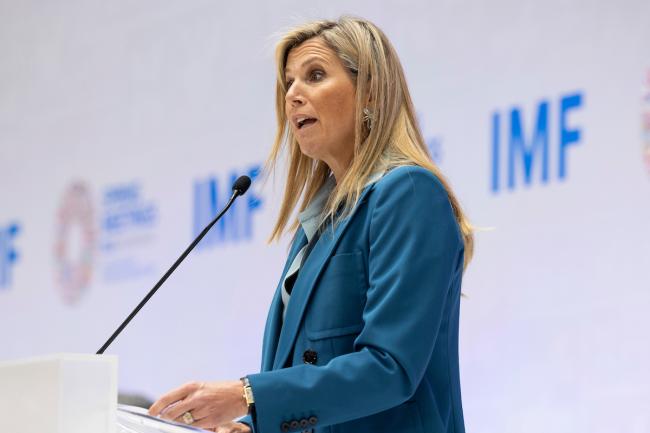H.M. Queen Máxima of the Netherlands, the United Nations Secretary-General’s Special Advocate for Inclusive Finance for Development (UNSGSA), delivered opening remarks at the IMF Seminar on Digital Public infrastructure: Stacking Up the Benefits, during the IMF-World Bank Spring Meetings held in Washington D.C. on 14 April 2023.
---
Thank you, Ms. Georgieva, Minister Sitharaman, Ms. French Gates, Mr. Nilekani, Mr. Schulman, Ladies and Gentlemen,
It is a great pleasure to join you in person at this year’s Annual Meetings, and to hear from so many thought leaders in technology, development, and finance.
These are challenging times for the world economy – and people living in emerging markets are being hit particularly hard.
Yet this seminar highlights a burgeoning and promising approach to make economies work better for everyone, offering vulnerable people a real opportunity to build a better life.
Digital public infrastructure, or DPI, is generally understood as interoperable, open, and inclusive systems supported by technology to provide essential public and private services in the public interest.
Over the past decade, as the UN Secretary-General’s Special Advocate, I have seen how inclusive DPIs can have a transformative impact on even the poorest households and businesses.

Safe, transparent, and interoperable systems for payments, identity, and data sharing have really empowered millions of small merchants—men and women, rural and urban. And today they can easily open accounts, or receive and make payments, with their own mobile phones.
Inclusive DPIs can catalyze digital contracts and e-commerce solutions.
And this, ladies and gentlemen, creates more efficient and competitive markets, and provides new opportunities to people previously left out.
And it isn’t just finance. They can also support health, think about education, and think about sustainability.
During the COVID pandemic, DPIs allowed welfare to be delivered directly to the digital wallets of those who needed it most and also supported the roll-out of vaccines at unprecedented speeds.
So, what does this look like in practice?
India has shown one way with India Stack. It combines foundational digital ID, an interoperable payments system, a digital credentials ledger, and account aggregators, to support empowerment and protection.
The results have been dramatic: India has achieved over 80% financial inclusion in just six years – compared to the 46 years it would have taken without a DPI approach. So six years verses 46 years.
Brazil, Peru, Singapore, and Estonia have also developed DPI models that bring together ID, payments, and e-governance use cases, with real clear results.
Of course, DPIs will vary by country – different contexts require different designs – but in the most successful cases we do see some common features.
The best DPIs are inclusive, interoperable, and support essential public and private services. They are also safe, and trusted, and ensure robust data protection.
And by the way the fact that you have DPIs have the “public” name in it, does not mean that the public sector can make it. The private sector can too, it just has a public interest.
So, please, let us share our experiences, and learn from the best examples, to spread the benefits even further.
The G20, the IMF, the World Bank, the UN, and the Bank for International Settlements, can help governments and central banks exchange knowledge.
New global platforms, like the Digital Public Goods Alliance, can bring more voices into the conversation.
The World Bank, and new emerging financing platforms like Co-Develop, can also mobilize the finance needed to deploy and scale-up essential infrastructure.
In my role as the Honorary Patron of the G20 Global Partnership for Financial Inclusion, I am really delighted that we are crafting policy recommendations for DPI under the Indian Presidency.
By bringing the public and private sectors together around DPIs that are truly inclusive, we can make real progress on the Sustainable Development Goals, and in building increased resilience.
We have so many people left out in our economies. And if digital will provide an opportunity, we will have to build up the traffic lights and rules, for the benefit of everyone. So, please, do pay attention to this. Thank you so much.
